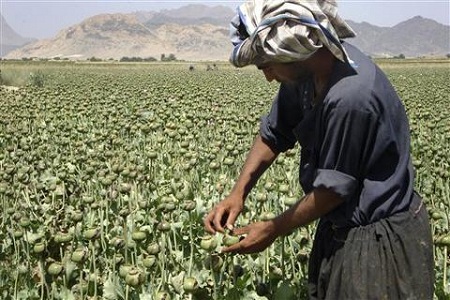By Margaret Besheer
A new U.N. report on illegal drugs says Afghanistan accounts for the majority of the world’s production of opium, while trends show production in Burma to be on the rise. The report also found that between 12 and 21 million people worldwide use opiates, with three-quarters of them using heroin.
The U.N.’s drug czar, Yury Fedotov, said at the report’s launch Thursday that illicit drug use is harmful to stability, security and health in many parts of the world.
“Drug trafficking is fueling a global criminal enterprise worth hundreds of billions of dollars that wreck havoc on communities and undermining development and security in many countries in the world. We are also witnessing more and more acts of violence, conflicts and terrorist activities stoked by drug trafficking and organized crime,” he said.

An Afghan man collects resin from poppies in an opium poppy field in Panjwai district of Kandahar province, Afghanistan, May 21, 200. (Photo: AP)
He noted progress on two fronts, supply and demand, saying global markets for the world’s two most problematic drugs - cocaine and heroin, declined last year. Heroin consumption has stabilized in Europe and cocaine consumption has declined in North America - the most lucrative markets for these drugs.
But he said those positive developments were offset by worrying trends elsewhere, particularly in the increased use of synthetic and prescription drugs.
The report, which distilled data from 2007 through 2010, found that cannabis is the world’s most popular illicit drug, with between 125 and 203 million people using it in 2009.
In 2009, the global opiate market was valued at $68 billion, largely due to heroin use.
Fedotov said Afghanistan continued to be the world’s leading grower of opium poppies accounting for 74 percent of global production in 2010, a 14 percent drop from the year before. But he said this was due to a blight [plant disease] that wiped out half the country’s poppy crop, and that production is likely to bounce back this year due to better yields.
“In Afghanistan, opium cultivation is closely linked to insecurity and trafficking opium and heroin is helping to spread instability throughout the wider region. The international community understands that confronting the problem of Afghan opium is a shared responsibility that requires a coordinated response,” Fedotov said.
He noted a disturbing trend in Burma, also known as Myanmar, saying its share in global production had risen from five percent to 12 percent between 2007 and 2010.
Fedotov said amphetamine-type stimulants are the second most widely used group of illegal drugs, noting that over the last 12 years consumption of these drugs has grown most rapidly in developing countries, especially South East Asia.
Meanwhile, West Africa has become an important transit hub for drug traffickers, while South America - a major cocaine producer - is now a significant consumer of the drug as well.
Speaking at the report’s launch, U.N. Secretary-General Ban Ki-moon said there are more than 200 million illicit drug users worldwide and their addiction kills one of them every three minutes. He said drug addiction should be treated as a disease, not a crime.



